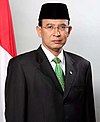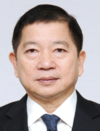The Golkar Party or Party of Functional Groups is a political party in Indonesia. It was founded as Sekber Golkar in 1964, and participated for the first time in 1971 as Golkar. At this point, Golkar was not a political party. In 1999, forced by the new election law, the groups reformed itself as a political party.

The United Development Party is an Islam-based political party in Indonesia. Due to its distinctive logo, the party is known as the "Kaaba Party".

Elections in Indonesia have taken place since 1955 to elect a legislature. At a national level, Indonesian people did not elect a head of state – the president – until 2004. Since then, the president is elected for a five-year term, as are the 575-member People's Representative Council, the 136-seat Regional Representative Council, in addition to provincial and municipal legislative councils.

The Indonesian National Populist Fortress Party was a political party in Indonesia. The founder, Eros Djarot was dissatisfied with the Indonesian Democratic Party – Struggle, which refused to allow him to stand as chairman against Megawati Sukarnoputri at the party conference in 2000. Eros then formed the Bung Karno National Party, named after Indonesia's first president Sukarno. However, as the law did not allow the use of national figures in party names, this was changed to the Freedom Bull National Party.
The Democratic Nationhood Party was a political party in Indonesia. It was established in 2002 as the United Democratic Nationhood Party by a group of intellectuals including Ryaas Rasyid and Andi Mallarangeng, formerly president Susilo Bambang Yudhoyono's spokesman, who were disatissfied with the progress of the reform movement following the Fall of Suharto.

The Indonesian Democratic Vanguard Party was a political party in Indonesia. It was a continuation of the Indonesian Democratic Party (PDI), one of the two state-approved parties during the New Order. After the PDI failed to achieve enough votes in the 1999 legislative elections to qualify for the 2004 elections, it changed its name to the Indonesian Democratic Vanguard Party In 2004 it won one seat. The party contested the 2009 legislative election, but won only 0.13 percent of the vote, less than the 2.5 percent electoral threshold, thereby losing its only seat in the People's Representative Council. Following its poor result in the 2009 vote, the party joined nine other smaller parties to form the National Unity Party. The party also attempted to contest the 2014 elections, but failed to fulfill the criteria set by the General Elections Commission, and along with nine other parties who also failed to qualify, decided to merge into the People's Conscience Party (Hanura).
The Democratic Renewal Party was a political party in Indonesia. It was established in 2005 by former members of the Indonesian Democratic Party – Struggle (PDI-P) who were once close aides of party leader Megawati Sukarnoputri. Following the 2005 PDI-P congress, differences appeared over the nature of democratic methods within the party. A group of people, including Petrus Selestinus, took the view that although the PDI-P was a modern political party, it still used the old authoritarian methods such as giving absolute prerogative rights to the party chairman and having only one candidate for senior positions. This group then established the Democratic Renewal Party. Unlike the PDI-P, it had a system of collective leadership, with 35 people forming the national leadership.
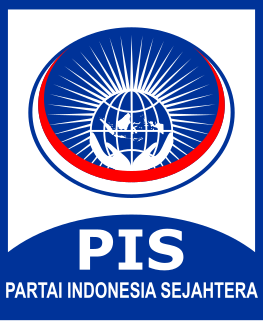
The Prosperous Indonesia Party was a political party in Indonesia. It contested the 2009 elections, but won only 0.3 percent of the vote, less than the 2.5 percent electoral threshold, meaning it was awarded no seats in the People's Representative Council.</ref> Following its poor result in the 2009 vote, the party joined nine other smaller parties to form the National Unity Party. The party also attempted to contest the 2014 elections, but failed to fulfill the criteria set by the General Elections Commission, and along with nine other parties who also failed to qualify, decided to merge into the People's Conscience Party (Hanura).
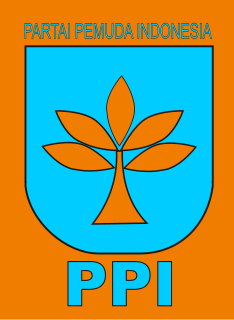
The Indonesian Youth Party was a political party in Indonesia. It contested the 2009 elections with a platform of motivating young people to participate in national development. The party won only 0.4 percent of the vote, less than the 2.5 percent electoral threshold, meaning it was awarded no seats in the People's Representative Council. Following its poor result in the 2009 vote, the party joined nine other smaller parties to form the National Unity Party. The party also attempted to contest the 2014 elections, but failed to fulfill the criteria set by the General Elections Commission, and along with nine other parties who also failed to qualify, decided to merge into the People's Conscience Party (Hanura).

The 'Regional Unity Party was a political party in Indonesia. The party was founded as a result of the reforms to the People's Consultative Assembly, Indonesia's supreme law-making body which used to consist of the elected People's Representative Council plus members appointed from the regions and functional groups. When these unelected members were removed in 1999 after the first democratic elections following the fall of Suharto, several regional representatives' led by Oesman Sapta, tried to reestablish the Regional Representatives Faction. The members of this faction took the view that the elected Regional Representatives Council, which replaced the unelected members of the People's Consultative Assembly, would not be effective as it was too small. They therefore decided to establish a political party to represent the interests of the regions.
The Socialist Party was a political party in Indonesia. It was founded in December 1945 at a meeting in Cheribon, as the Socialist People's Party (Paras) of Prime Minister Sutan Sjahrir and the Socialist Party of Indonesia (Parsi) of Defence Minister Sjarifuddin merged. Sjahrir became chairman of the unified party, whilst Sjarifuddin became vice-chairman.

Catholic Party had been a political party for Indonesia's Catholics from colonial times to the 1970s. In 1967 members were involved in debates concerning religious freedom in the New Order and the influence of missionaries on the nation. In the following decade it merged with other parties to form the Indonesian Democratic Party, which has since been renamed the Indonesian Democratic Vanguard Party.

Legislative elections were held in Indonesia on 9 April 2014 to elect 136 members of the Regional Representative Council (DPD), 560 members of the People's Representative Council (DPR) and members of regional assemblies at the provincial and regency/municipality level. For eligible voters residing outside Indonesia, elections were held on 5 or 6 April 2014 based on the decision of the electoral commission of each different countries.

Ma'ruf Amin is an Indonesian politician, Islamic cleric and lecturer who is the 13th and current vice president of Indonesia. Aged nearly 77 years old when inaugurated, he is the oldest Indonesian vice president to ever be sworn in.
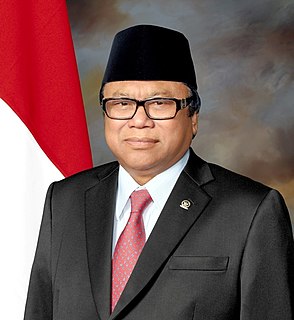
Oesman Sapta Odang is an Indonesian politician of the People's Conscience Party (Hanura), serving as the speaker of the Regional Representative Council and deputy speaker of the People's Consultative Assembly. He had also served in the latter position between 2002 and 2004.
The Chinese Indonesian Democratic Party was a political party that existed during the Guided Democracy era in Indonesia, from 1948 until 1965. The party identified itself as a supporter for the relationship between Indonesia and China, and supported the mandatory teaching of the Chinese language in Indonesian schools.
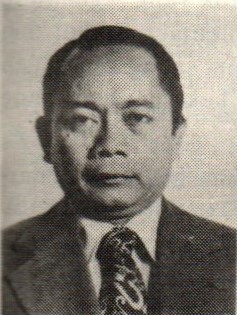
Jailani "John" Naro, also known as Haji Naro or John Naro was a former prosecutor that became an Indonesian politician.
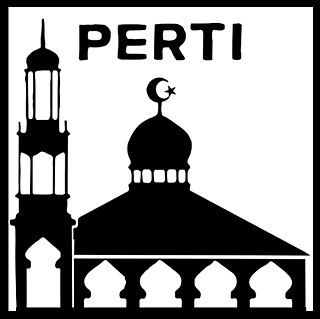
The Islamic Education Movement was a political party in Indonesia. Based in Bukitinggi, it contested the legislative elections in 1955 and 1971 before being merged into the United Development Party in 1973.





